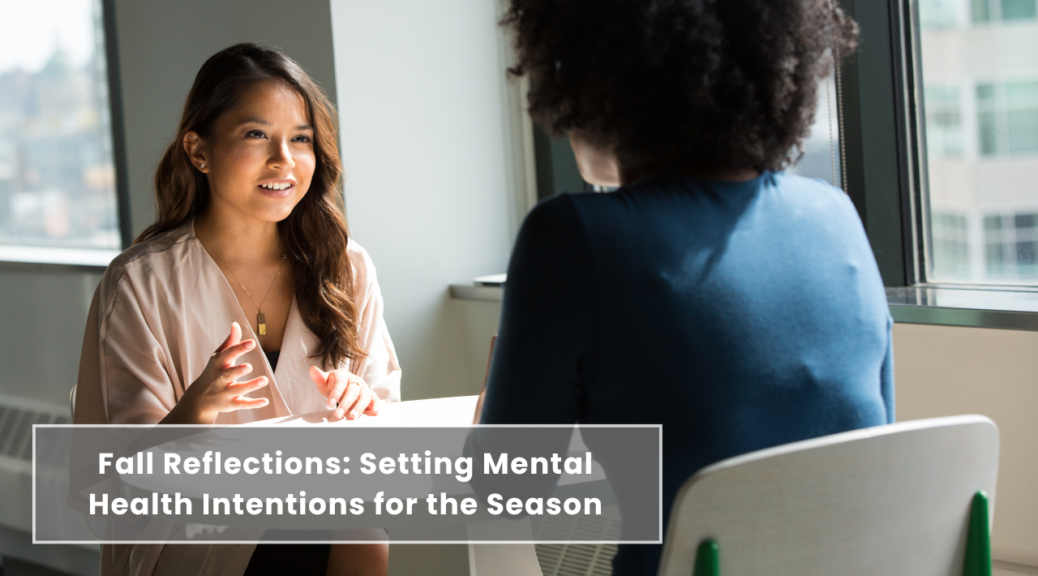Fall mental health is a topic that deserves attention as this time of transition can also be a natural opportunity for introspection and setting intentions for your mental health. How can fall reflections pave the way for a season of emotional well-being?
As fall mental health becomes a priority, it’s important to reflect on your summer experiences. What brought you joy? Did you engage in activities that nourished your spirit? Perhaps there were challenges you faced. Recognizing both the positive and negative aspects of summer can provide valuable insights for navigating the upcoming season.
Guiding Questions to Consider
Here are some guiding questions to consider:
- What were the highlights of my summer?
- Did I spend enough time with loved ones?
- Did I prioritize activities that reduce stress and promote relaxation?
- What challenges did I encounter, and how did I cope with them?
- Did I experience any situations that negatively impacted my mental well-being?
By reflecting on these questions, you can gain a deeper understanding of your emotional needs and preferences because self-awareness serves as a foundation for setting your fall mental health intentions.
Now that you’ve reflected on your summer, let’s turn our focus towards the fall season. Setting clear intentions allows you to approach the season with purpose and prioritize your mental well-being.
Tips for Setting Positive Fall Intentions
Here are some tips for setting positive fall intentions:
- Focus on Self-Care: Fall is a time for cozy nights in and nurturing routines. Make self-care a priority by scheduling activities that promote relaxation and bring you joy. This could include anything from taking a warm bath to reading a good book.
- Embrace Gratitude: Gratitude is a powerful tool for enhancing well-being. Incorporate gratitude practices into your fall routine, like writing down things you’re thankful for each day.
- Maintain Social Connections: As the days shorten, it’s easy to feel isolated. Schedule regular social activities with loved ones or consider joining a fall-themed community event.
- Prioritize Movement: Physical activity is essential for both physical and mental health. Find ways to stay active during fall, whether it’s taking brisk walks in nature or exploring a new workout routine.
- Seek Professional Support if Needed: If you’re struggling with your mental health, don’t hesitate to seek professional support. A therapist can provide guidance and tools to navigate challenges and create a supportive environment for growth.
Remember, your intentions can be big or small. The most important thing is to choose intentions that resonate with you and will contribute to your overall well-being throughout the fall season.
Tips for Maintaining Your Mental Health
Fall mental health can be a challenge, but it’s also a time for growth and renewal. Here are some tips for maintaining your mental health throughout the fall:
- Establish a Routine: As the days shorten, your sleep schedule might be disrupted. Creating a regular sleep routine can help regulate your sleep patterns and improve your mood.
- Practice Mindfulness: Mindfulness techniques like meditation or deep breathing can help manage stress and anxiety. Regularly incorporating these practices into your fall routine can create a sense of calm and inner peace.
- Be Flexible: Fall weather can be unpredictable. Allow yourself to be flexible with your plans and practice acceptance when things don’t go as expected.
Fall is a time for change and renewal. By prioritizing your mental health and setting clear intentions, you can harness the beauty of this season and create a foundation for emotional well-being.
How CCHC Can Help
The Center for Connection, Healing, and Change (CCHC) takes an interdisciplinary approach, interweaving psychotherapy and neuroscience with the timeless wisdom of mindfulness and meditation.
We promote connection, healing, and change in the following areas: couple and family relationships, substance use and processing addictions, depression and/or anxiety, self-worth and identity, sexual life, baby bonding and communication, attachment, experiences of trauma, abuse, and PTSD, childhood experiences and family of origin work, chronic pain and physical illness, military life, parenting, stress management and resilience building, emotional regulation and wellbeing, anger management, spiritual life, behavioral issues, and sexuality.
Our therapists work with couples, children, teens, families, and adults—all from a systemic and holistic perspective.
We are particularly committed to providing services grounded in trauma-informed care, somatic and body-based approaches, and attachment-focused ways of working.
Schedule a free consultation with us today, or visit our offices in Woodbridge or Fairfax.




